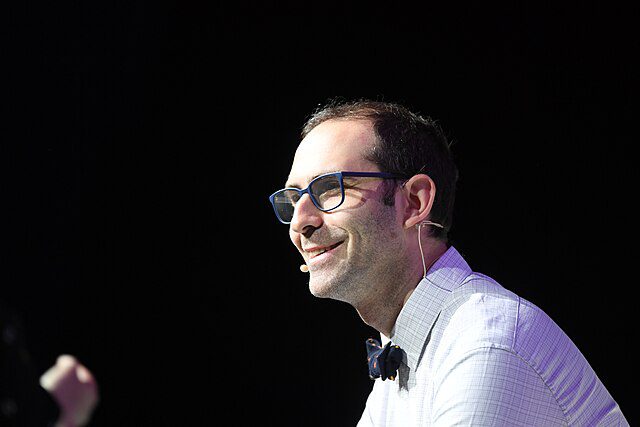Emmett Shear ’05 briefly appointed OpenAI CEO amid chaotic turnover
Shear, a computer science major in Davenport College, served as interim CEO for 72 hours before the company board of directors chose to reinstate CEO Sam Altman.

Wikimedia Commons
Yale alum Emmett Shear ’05 was CEO of OpenAI for 72 hours last week amid the ouster and subsequent reinstatement of Sam Altman.
Shear, who previously served as the CEO of Twitch, was named interim CEO of OpenAI on Nov. 19, following the removal of Sam Altman by the OpenAI board of directors on Nov. 17, two days prior. Microsoft quickly hired Altman after the ouster, but he was subsequently reinstated as OpenAI CEO on the night of Nov. 21.
“The appointment, even if temporary, is significant both for Yale’s reputation and the tech community as a whole,” computer science professor Mark Gerstein wrote to the News. “Leaders in the tech industry serve as pivotal role models and inspirational figures for those pursuing technical professions.”
OpenAI, a nonprofit artificial intelligence startup and prominent player in the tech world, is known for creating ChatGPT.
Altman’s ouster came after he had served four years at the company’s helm — he was first appointed CEO in 2019.
“Mr. Altman’s departure follows a deliberative review process by the board, which concluded that he was not consistently candid in his communications with the board, hindering its ability to exercise its responsibilities,” the company said in a Nov. 18 blog post.
The next day, even before Shear’s appointment as interim CEO, The Verge reported that the board was in discussions to bring Altman back as the company’s chief executive. On Nov. 20, a day after Shear was appointed, reports emerged that 95 percent of OpenAI workers had threatened to quit if Sam Altman were not reinstated as CEO.
Shear ran OpenAI for 72 hours before the company announced that Altman would be brought back on as CEO. It is unclear whether Shear will remain at OpenAI in any capacity.
“Coming into OpenAI, I wasn’t sure what the right path would be,” Shear wrote on X following the announcement. “This was the pathway that maximized safety alongside doing right by all stakeholders involved.”
Among the changes at the company following Altman’s reinstatement, the company’s board of directors saw turnover in its membership; the new members include former Harvard University President Lawrence Summers and former Salesforce CEO Bret Taylor.
Gerstein said that Shear’s brief stint as OpenAI CEO is especially notable given Yale’s “limited presence in tech leadership” compared to peer schools such as Stanford University and Harvard University.
Altman attended Stanford for one year before dropping out.
“Shear’s brief consideration for a leadership role at Open AI is encouraging and represents a positive stride for Yale’s Representation in tech” Gerstein wrote to the News. “Emmett’s potential leadership role at Open AI is encouraging, particularly because Open AI is an especially desirable company for many individuals involved in generative AI.”
Shear lived in Davenport College and majored in computer science during his time at Yale, and he expressed an interest in tech and entrepreneurship throughout his undergraduate years.
In 2005, during his senior year, Shear was admitted to the inaugural cohort of startup accelerator Y Combinator, where he co-built a calendar application called Kiko that eventually sold for $250,000 dollars. A year later, he co-created Justin.tv, a 24/7 live video feed documenting the life of classmate and friend Justin Kan ’05 that broadcasted via a webcam attached to Kan’s head.
The site quickly grew into one of the pioneering applications of live video platforming, particularly in the gaming sector. In June 2011, under Shear’s leadership as CEO, the company spun off its gaming content to create Twitch, a live-streaming service focusing on video game content. In 2014, it sold to Amazon for a reported $970,000,000.
“It was obvious to those of us who had him in our classes that he had a passion in computer science,” Y. Richard Yang, a computer science professor, wrote to the News two days after Shear’s appointment as interim CEO. “It is not surprising at all that a top Yalie like him is the choice of leader for an organization that is developing among the most advanced computer science technologies with potentially most profound societal impacts.”
According to Yang, Shear took the “most demanding” computer science courses at Yale, including CPSC 690, an independent research track designed for graduate students. Yang described him as “highly capable but humble,” and someone who had a specific passion for exploring the impact of technology on society.
As a junior in 2004, Shear and a team of three other students entered a debate competition on “Voting in an e-Democracy” held by the Yale Faculty of Engineering, per computer science professor Michael Fischer.
Shear and his team made the final round, and at the recommendation of Fischer, turned their arguments into a publishable paper, titled “Tiny Systematic Vote Manipulations Can Swing Elections.”
The paper, using sample data from the 2000 U.S. presidential election, suggested that a hypothetical election attacker could modify the software on voting machines to arbitrarily change a small number of votes on each machine and concluded that just one vote on each electronic voting machine could have changed the outcome of the 2000 U.S. Presidential election. It was first published within the Yale Computer Science department, and then in the Association for Computer Machinery’s journal.
ChatGPT first launched on Nov. 30, 2022.







